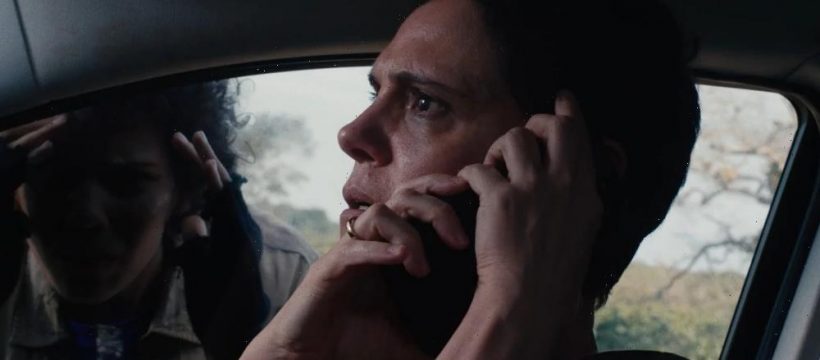Paris-based Loco Films has released the tense, terrifying trailer for “Property,” Brazilian director Daniel Bandeira’s survival thriller that’s set to have its world premiere Feb. 23 in the Panorama section of the Berlin Film Festival.
Lensed by veteran cinematographer Pedro Sotero, the DP behind Kleber Mendonça Filho’s 2019 Berlinale player “Bacurau,” “Property” follows a woman who flees her family estate in an armored car after local workers rise up to occupy it. Trapped inside the vehicle, she refuses to negotiate, prompting a collision between the competing worlds of haves and have-nots that speaks to a growing schism taking shape in societies across the globe.
Bandeira’s sophomore effort is a timely and explosive portrait of a society on the brink. “Brazil is a time bomb,” the director told Variety. “We’re running toward a point where this bomb will eventually blow up.” He added: “A reckoning is on the way.”
“Property” is produced by Simio Filmes and Vilarejo Filmes, whose credits include other politically minded films such as “Aquarius.” The film stars veteran Brazilian screen star Malu Galli as Theresa, who can be seen in the trailer narrowly escaping a hostage situation at the hands of an armed assailant. Flash forward and the still-traumatized woman is persuaded by her husband (Zuleika Ferreira) to retreat to the family’s country estate — where they soon learn local farm workers have risen up against their exploitative bosses.
https://youtube.com/watch?v=OuZOmoMcEsw%3Fversion%3D3%26%23038%3Brel%3D1%26%23038%3Bshowsearch%3D0%26%23038%3Bshowinfo%3D1%26%23038%3Biv_load_policy%3D1%26%23038%3Bfs%3D1%26%23038%3Bhl%3Den-US%26%23038%3Bautohide%3D2%26%23038%3Bwmode%3Dtransparent
What could have easily played out as a social-issues drama becomes, in Bandeira’s hands, a pulse-pounding thriller, with the director — who was part of the influential Brazilian collective Recife alongside Mendonça Filho — noting that genre conventions gave him “a great way to give shape to those issues, while bringing them to larger audiences.”
In earlier versions of the script, “Property” was entirely told from Theresa’s perspective; the workers revolting against their unfair labor conditions “were just blurred silhouettes behind the armored windows,” Bandeira said.
The director acknowledged that the story felt tonally off. “[With] the class struggle here in Brazil in the past decade, it felt insensitive just to look at the person inside the car,” he said. “I needed to know who was outside the car: What were their needs, their fears, their histories?”
That shift in perspective marked a dramatic about-face, while also reminding the viewer of the film’s larger stakes. “Brazilian history is a ghost story,” said Bandeira. “The way we deal today with our social issues recalls our past of slavery and colonialism. These things just got an upgrade over the years — a rebrand. And in doing so, we tend to lose sight of the root of our problems.
“[The country’s violence] comes from lots of years — centuries, even — of oppression and inequality,” he continued. “We tend to sympathize with Theresa because within the timeframe of the film, we are watching an immediate act of violence that everyone will relate to. If you look at the bigger picture, you know that the scale [is larger].”
Production on “Property” wrapped on Oct. 7, 2018: the same day that millions of Brazilians headed to the polls for an election that would bring right-wing ideologue Jair Bolsonaro to power. “It was a film that was dealing with very heavy historical issues, and we were living history right at that moment,” said Bandeira. “I think the film is soaked with the present history.”
The film’s long journey to completion, with post-production hobbled first by funding cuts, then the COVID-19 pandemic, is emblematic of the state of Brazilian filmmaking under the former president. “The Bolsonaro presidency really tried to suffocate not only cinema but all forms of arts and culture in these previous four years,” said Bandeira. Production in Brazil — once a South American powerhouse — has tailed off: “Property” is the country’s only narrative feature film at this year’s Berlinale.
Bandeira said the Brazilian film industry has been reenergized since the 2022 reelection of Luiz Inácio Lula da Silva, whose policies during his first administration in the 2000s were supportive of the arts. “Since the election of Lula, we have really positive signs that cultural policies will be [restored] and artists are going to be valued again,” he said. “Brazil was very closed during [the Bolsonaro years]. Now we are very eager to talk to the rest of the world.”
Read More About:
Source: Read Full Article
